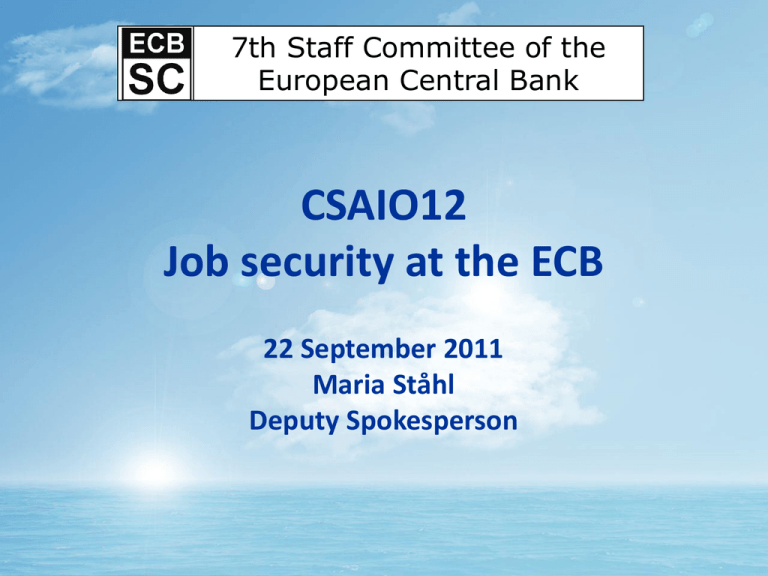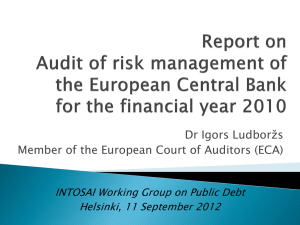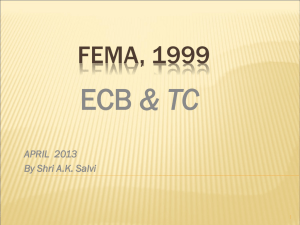CSAIO12 Job security at the ECB
advertisement

7th Staff Committee of the European Central Bank CSAIO12 Job security at the ECB 22 September 2011 Maria Ståhl Deputy Spokesperson Agenda • • • • • Termination of contracts The contractual situation Disciplinary measures Outsourcing/tasking functions What if some functions get terminated? 2 Termination of contracts Conditions of Employment (CoE): 11. (a) Contracts of members of staff may be terminated by the ECB on a reasoned decision of the Executive Board in accordance with the procedure laid down in the Staff Rules and on the following grounds: (i) in the case of continued unsatisfactory performance. Termination of a contract by the ECB for this reason shall be subject to a period of notice of three months and to a severance payment of one month’s salary per completed year of service, up to a maximum of twelve months. The Executive Board may release a member of staff from actual duty during his/her period of notice; 3 Termination of contracts continues (ii) in the case of redundancy. For the purposes of these Conditions of Employment, “redundancy” means a reduction in the number of positions at the ECB attributable wholly or mainly to the permanent termination of the function or activity for which the member of staff was employed or to the policy decision to dispense with the said function or activity for an indefinite period. Specific measures of compensation which shall be at least equal to those given under (i) above shall be decided by the Governing Council; 4 Termination of contracts continues • (iii) where the accession process will not be completed by the accession country of which the member of staff is a national within the timetable laid down by the Council of the European Union. A severance payment as provided under (i) above shall be granted; • (iv) for disciplinary reasons. 5 The contractual situation • • • • Fixed term contracts Convertible/ non convertible positions Extended probation time Non-extension of the contract 6 Fixed Term Contracts • Until 2004 the norm was permanent contracts • With the intake of new member states this was changed to fixed-term contracts with duration of 3 years • This increased the job insecurity and divided the staff in to two categories –permanent and fixed term. 7 Convertible/non convertible positions • Not only dividing the contracts into two categories the ECB managed to create a third category – non convertible fixed term contracts. In 2006 6 colleagues challenged this internally and the rules were clarified to make it more clear which contracts are convertible and which are not. • This was later changed again due to a request from the legal department • Still today this causes problems one of them being extended probation time 8 Example of a fixed term contract announcement Duration of contract Fixed-term contract until 31.10.2014, which may be extended subject to organisational need and performance. • Can someone tell us when this contract ends? • For your information my own contract ends on the month when I will be 65. 9 Legality? • Council Directive 99/70/EC of 28 June 1999 concerning the framework agreement on fixed-term work concluded by ETUC, UNICE and CEEP: • . For the purpose of this agreement the term "fixedterm worker" means a person having an employment contract or relationship entered into directly between an employer and a worker where the end of the employment contract or relationship is determined by objective conditions such as reaching a specific date, completing a specific task, or the occurrence of a specific event. 10 Good to keep in mind • The parties to this agreement recognize that contracts of an indefinite duration are, and will continue to be, the general form of employment relationship between employers and workers.They also recognise that fixed-term employment contracts respond, in certain circumstances, to the needs of both employers and workers. 11 Extended probation time • The Conditions of Employment at the ECB say the following: • CoE PART 2 EMPLOYMENT RELATIONS Employment with the ECB shall be subject to medical and security clearance. Appointments may be subject to a probationary period in accordance with the provisions laid down in the Staff Rules.The probationary period shall in no circumstances exceed twelve months. • CoE PART 2 11(b) During the probationary period or in the case of dismissal for disciplinary reasons, the period of notice shall be one month. 12 Probation in practice • By the introduction of the fixed-term contracts the ECB clearly increased the probation time first intentionally from three months to six • In order to be converted you need to have a sufficient level of performance which is evaluated in a very subjective and opaque Annual Salary and Bonus Review (ASBR). • In the Staff Rules it is stated: – Subject to the interest of the service, such contracts (hereinafter ‘convertible contracts’) may be converted in case of at least overall satisfactory performance of the member of staff over the period of the convertible contract. 13 Probation continues • What actually happens is that in practice the probation period is two and half years. • In the case you had a position which was not convertible, but you were successful to get it when the person who had it before moved somewhere else you can have a 3+2.5 years of probation as the previous contract is not taken into account! • This probation periods are clearly beyond any reasonable limits. 14 Redress? • PART 8 APPEALS AND DISCIPLINARY PROCEDURES • 41. Members of staff may ask for an administrative review of decisions taken in their individual cases, using the procedure laid down in Part 8 of the Staff Rules. Members of staff who remain dissatisfied following the administrative review procedure may use the grievance procedure laid down in Part 8 of the Staff Rules. • Such procedures may not be used to challenge any of the following: • (i) a Governing Council decision or any ECB policy, including any policy laid down in these Conditions of Employment or in the Staff Rules; 15 Redress continues • (ii) a decision for which special appeals procedures exist; • (iii) a decision not to confirm the appointment of a member of staff serving a probationary period; • In the case you are dismissed during your probation period you have no ways to appeal. 16 Disciplinary procedures • In the case there are disciplinary proceedings against a member of staff who is on a fixed term contract and the decision is to give the MoS a written warning or a written reprimand which will be added to her/his personal file will make it impossible to get a new contract as this file is showed to the manager who is recruiting. • Also disciplinary procedures can be used to get rid of unwanted MoS.This is of course much harder to prove. 17 Underperformance • Underperformance is a possibility to dismiss MoS and this again increases the job insecurity. • 2.2.5 The conditions under which the ECB’s right to terminate a contract of employment on the basis of a member of staff ’s continued unsatisfactory performance can be exercised are as follows: • (a) Specific performance problems must have been determined and documented. 18 Underperformance continues • (b) The member of staff concerned must have been given the opportunity and in particular sufficient time (taking into account the level of the job and the performance problems) to address and correct the performance issues raised. In this respect, the member of staff concerned must be informed in writing that the performance issues being addressed are of such a serious nature that termination of the employment contract is envisaged at the end of the procedure unless the performance issues are addressed to the satisfaction of the Manager concerned. 19 Underperformance continues • (c) The proposal to terminate an employment contract under this procedure must be fully documented and given to the member of staff concerned one week before the said proposal is due to be placed on the agenda of the Executive Board for its decision. 20 Outsourcing/tasking functions • Outsourcing the core tasks of the ECB is difficult, but possible.There has been attempts to do so with the IT department.The difficulty has been the German Labour Law. • There has been already some out tasking in certain projects and also there are every now and then discussions about the out tasking of the Statistics department, but in this case the quality loss has been considered to be too big. 21 What if some of the functions get terminated? • This has not been discussed, but for sure needs to be tackled. • Open questions are can there be special arrangements to work at other European Institutions? At other Central Banks and under which conditions? 22 THE END 23








